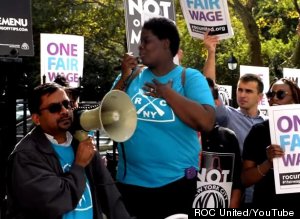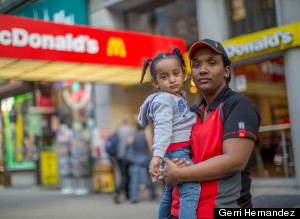Meet Four Working Moms Who Fought For Higher Wages
Mothers struggling to get by on low wages made headlines in 2014. Some got in trouble for leaving their children in a car or on a playground while they worked because they couldn’t afford child care. Politicians highlighted the plight of low-wage working women in stump speeches. And Walmart moms protested for better pay and working conditions.
The news stories were reminders of how single moms acutely feel the pain of the low-wage economy. Women make up the majority of minimum-wage workers, and theyhave been disproportionately affected by what has for years been a part-time, low-wage recovery. A single mom making the federal minimum wage of $7.25 an hourmust work 125 hours a week to afford food, shelter and child care for two kids, according to MIT’s Living Wage calculator.
Of course, many of these issues existed long before 2014. And there’s little sign the situation will change dramatically for these women in the years to come: The low-wage jobs the federal Bureau of Labor Statistics predicts will have the fastest growth through 2022 are female-dominated.
Beyond the headlines, there are stories of daily struggle that don’t get nearly as much attention — getting dinner on the table before heading to work or finding a friend to watch the kids during weekend shifts.
The women whose stories you’ll read below are trying to make a difference by keeping the world focused on the problems of women in low-wage jobs once the news cameras have moved on. All have taken part in campaigns to raise wages for low-wage workers. They’ve protested at fast food restaurants and helped sign people up to vote. Their efforts — along with other demonstrations, protests and outcry — have had an impact:Twenty states will raise their minimum wages on New Year’s Day.
Nakima Jones, 37, waitress, living in New York City with three kids :

I’ve been in the industry for 13 years. I’ve been having it hard since I started. Sexual harassment is one of my big issues. I’m a big-breasted woman, so that was one of the only ways that I could get certain things. Why do I have to be so nice to you get a good tip? Why do you have to say “hey baby how are you doing? Take my number”? If I don’t take it, that means I’m not going to get a good tip, and they still would leave you a bad tip anyway. I did all that nice stuff for no reason.
I’m here to work, make money and leave. I’m not doing no extra. If I want that section I should be able to get it if I come in on time and do what I need to do.
I have kids, you have to learn how to respect yourself.
My kids go to school in the daytime and I try to usually work in the evenings. By the time I go to work, they’re home, they’re settled and I’ve cooked dinner for them.
I make all the money in my family, it’s just me. I’m a single parent — that’s another thing that’s hard.
Why do I have to keep getting $5 an hour? We deserve better. There are a lot of people that are afraid to speak up. If we’re here standing strong, why can’t the government help us out?
Patrice Dandridge, 44, home health aide living in Chicago. Has a 26-year-old daughter:

I just love helping people in every way possible. Being a health care aide, you’re helping people that can’t help themselves. I have three clients that I help.
I don’t make minimum wage, I make $10 an hour. It’s still not much, it’s not easy for me to get by, with the cost of living going up all the time. You can’t find an apartment that you can keep up with your rent earning $10 an hour. My expenses are more than I make. I can bring home $1,200 a month, rent is $700, light and gas is $100 apiece, and we’re not even talking about cell phone bills and other personal expenses.
[Growing up], my daughter spent a lot of time with my mom, and eventually my mom and I decided to let my daughter stay with her because I couldn’t afford to take care of both of us because of my income. Thank God for my mom of course.
Politicians basically look out for the middle class and the upper class, and they support them more. I just complained about it, and I finally realized that I can complain all day long, but I have to start doing something more. It takes a community to come together to get what we want. Until the community can come together, then politicians aren’t really going to listen.
Paola Cabrera, 28, fast food worker living in New York City with her two kids:
Story told in Spanish through a translator.

For a year I lived at a shelter on 28th Street and Fifth Avenue. It only had a microwave and a refrigerator. The little that I earned at McDonald’s was just enough to buy food. As the head of my household they don’t give me enough. I earn $170 weekly. It’s really hard for me when my kids ask for a toy and I can’t buy it for them. It’s heartbreaking.
I want to provide as much as I can. Every month I get $140 in food stamps. I also get $100 every two weeks in cash assistance. That’s not enough living in the shelter where everything is so expensive around me. I can’t save up to make more. Living in New York is a constant struggle.
I used to work in assisted living. I couldn’t make it to interviews to renew my license because I couldn’t get child care. Now, I have subsidized child care. It’s really hard to get it, I spent 2 1/2 months filing paperwork. On weekends I work overnight and I don’t get to see my kids. Paying for a babysitter on a weekend is too expensive, so they usually stay with my friend.
The second week of working was when I decided things weren’t OK. That’s why I’m part of the movement now. I’ve done strikes, interviews, conferences. I’m encouraging all of my coworkers to join. A lot of them are afraid. I try to motivate them not to be afraid. It’s a free country.
I see my work at McDonald’s as just a stepping stone. I’m studying criminal justice, and I take online courses every Sunday. I want to do better and become better. Whoever I leave behind I’ll keep motivating. I’ll never stop fighting.
[Editor’s note: A representative for McDonald’s noted that about 90 percent of McDonald’s restaurants are owned by independent franchisees. “The topic of minimum wage goes well beyond McDonald’s — it affects our country’s entire workforce,” she wrote. “McDonald’s and our independent franchisees support paying our valued employees fair wages aligned with a competitive marketplace.”]
Claudia Leon, 36, maintenance worker and cashier. Lives in New York City, and her three kids live in Mexico:
Story told in Spanish through a translator.

I was working in a restaurant for $120 per week plus tips. I couldn’t support my family making that wage, and on top of that I had my tips stolen. I worked six days a week for eight or nine hours a day, and I didn’t have breaks. They would call me names, they would tell me I should quit my job. You end up staying there because you need to work and you need to provide. I didn’t feel comfortable leaving; I came to the U.S. four years ago from Mexico, and it was the only place I knew.
I was at the restaurant for 3 1/2 years. Now I work two jobs as a cashier and doing maintenance in an office building. I’m making triple now for fewer hours and it’s less stressful. I support my family back home and I’m their role model. The distance is very challenging, long-term my kids are going to be better off.
I protested in front of the business where I used to work. I’ve participated in the fast food campaign. I’ve testified in front of the wage and hour board. Many of us women play the role of both mother and father, and these wages aren’t enough to support families. It’s crucial for them to raise the minimum wage, especially in NYC. It’s not a salary where you can raise a family.
The accounts above have been edited for clarity.
Sourced from huffingtonpost.com

























Recent Comments